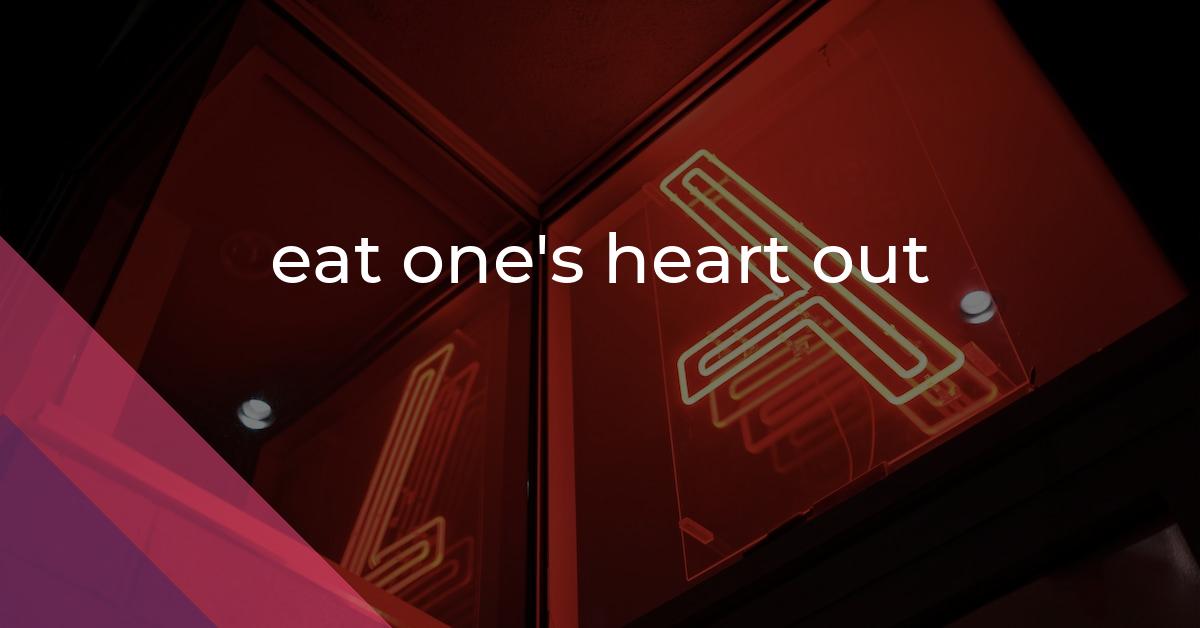eat one’s heart out: Idiom Meaning and Origin
What does ‘eat one's heart out’ mean?
The idiom "eat one's heart out" means to feel intense sadness or jealousy over someone else's success or happiness.

Idiom Explorer
The idiom "heavy-hearted" is used to describe a feeling of deep sadness or sorrow. It implies a weight or burden on one's heart, often caused by grief, disappointment, or a difficult situation.
The idiom "heart-shattering" refers to something extremely painful or devastating emotionally, causing great sorrow or grief.
The idiom "heart of hearts" refers to one's deepest and truest emotions or beliefs.
The idiom "have one's heart in" means to be passionately or deeply committed or invested in something or someone.
The idiom "have a heart" means to show compassion, empathy, or understanding towards someone or to be kind and forgiving. It is often used to encourage someone to be less strict or harsh in their judgment or actions.
The idiom "hate someone's guts" means to have a strong and intense dislike or hatred towards someone, often based on negative feelings towards their character or actions.
The idiom "green with envy" is used to describe someone who is extremely jealous or envious of someone else's success or possessions.
The idiom "gnaw someone's vitals" means to deeply trouble or torment someone emotionally or mentally, causing great distress.
The idiom "fire in the belly" refers to a strong determination and passion to succeed or achieve something, often in a competitive or challenging situation.
Hidden History
Additionally, there are two related idioms that are often used in conjunction with "eat one's heart out": "eat someone's lunch" and "eat one's feelings." These idioms have their own unique meanings and can be used to further enhance the understanding and usage of "eat one's heart out."
The idiom "eat someone's lunch" is used to describe a situation where someone is outperformed or outshined by another person. It conveys a sense of being dominated or defeated in a particular area or competition. For example, if someone is a talented musician and a newcomer arrives with even greater skill, you could say that the newcomer "ate their lunch."
Similarly, the idiom "eat one's feelings" is used to describe the act of eating to cope with or escape from negative emotions. It implies that a person resorts to food as a form of comfort or distraction, typically in times of stress or sadness. For instance, if someone is feeling down and eats a whole tub of ice cream, you could say that they are "eating their feelings."
These two idioms, along with "eat one's heart out," all involve the act of eating, but with different metaphorical implications. While "eat one's heart out" signifies intense longing or envy, "eat someone's lunch" represents being outperformed, and "eat one's feelings" pertains to using food as a coping mechanism.
These idioms create a rich tapestry of expressions that capture various aspects of human emotion and behavior. They allow for nuanced communication and provide a colorful way to convey complex feelings and experiences.
Overall, the idiom "eat one's heart out" is a powerful expression that has stood the test of time in the English language. Its origin can be traced back centuries, and it continues to be used today to convey intense emotions of jealousy, longing, and admiration. When used alongside related idioms like "eat someone's lunch" and "eat one's feelings," it can further enhance the depth and complexity of communication. So, the next time you feel a surge of envy or longing, or witness someone outperforming you, or turn to food for comfort, remember these idioms and let them add color to your conversations.
Example usage
Examples of how the idiom "eat one's heart out" can be used in a sentence:
- She didn't get the promotion she wanted, so now she's sitting at home eating her heart out.
- He broke up with his girlfriend, but she's already moved on. She's making him eat his heart out.
- The team lost the championship game, and the star player was left eating his heart out.
More "Emotions" idioms



